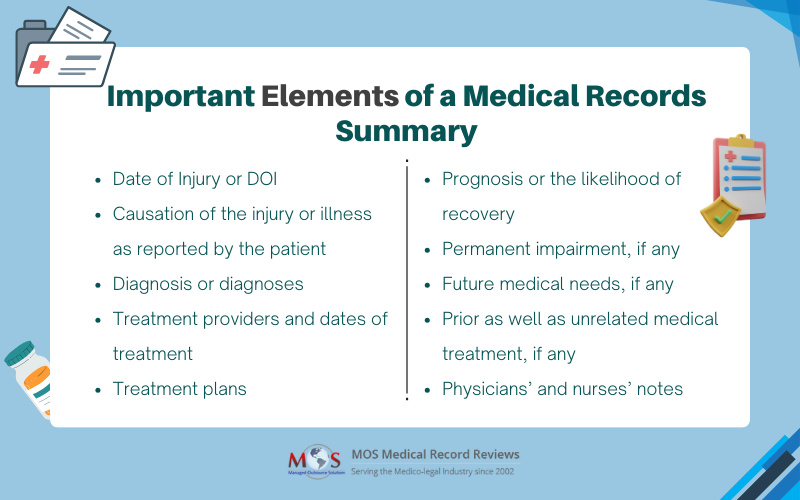Medical records are crucial in legal cases, providing essential insights into a client’s health history and treatment. Preparing a comprehensive medical records summary is an integral part of assisting attorneys in building a strong case. Preparing a flawless paralegal records summary for attorneys requires years of experience. The challenge is that paralegals with little training in medical terminology, treatment procedures and other relevant aspects may have to identify and report important details such as pre-existing conditions and treatment gaps. Any injury claim requires the preparation of a chronological medical summary that will help to understand the nature of the injury, the patient’s past medical history and its impact on the injury and other vital information. An attorney can evaluate a claim only after completely understanding the injury and its relationship to the incident in question. Attorneys and their paralegals have the option of using affordable medical review services to obtain timely medical records summary reports for legal use. This summary is significant in that it will be used for discovery and investigation, for preparing for the trial, for reporting to the claims adjuster, and for exhibits and witnesses.

Tips to Prepare a Medical Records Summary
- Obtain complete medical records: Gather all relevant medical records, including hospital records, physician notes, diagnostic reports, medication histories, and any other pertinent documents.
- Understand legal case context: Familiarize yourself with the specifics of the legal case. Understand the key medical events, treatments, and conditions that are relevant to the legal proceedings.
- Identify key medical providers: Identify and list the primary medical providers involved in the patient’s care. Include contact information and details about their specialties.
- Organize chronologically: Arrange medical records chronologically to create a clear timeline of the patient’s healthcare journey. This helps attorneys easily follow the sequence of events.
- Summarize relevant medical history: Provide a concise summary of the patient’s medical history, including pre-existing conditions, surgeries, and major medical events leading up to the incident in question.
- Highlight pertinent diagnoses and treatments: Identify and emphasize key diagnoses, treatments, surgeries, and medical interventions related to the legal case. Include dates, details, and outcomes.
- Outline medication history: Summarize the patient’s medication history, specifying prescribed medications, dosages, and any relevant changes. Highlight medications related to the legal case.
- Include radiology and laboratory results: Incorporate relevant radiology and laboratory results, emphasizing abnormal findings and their implications. Reference specific tests and their dates.
- Present in an accessible format: Organize the medical records summary in a clear and accessible format, facilitating easy navigation for attorneys, experts, and other stakeholders involved in the legal proceedings.
Need more tips?
Talk to our expert reviewers at (800) 670-2809!
Types of Medical Record Summaries Attorneys Require
- Chronological summary: It provides a chronological overview of the patient’s medical history, outlining key events, diagnoses, treatments, and outcomes in the order they occurred. This type of summary helps attorneys understand the timeline of medical care.
- Treatment summary: This focuses on detailing the specific treatments and interventions the patient received. It includes information about surgeries, medications, therapies, and any other medical procedures relevant to the legal case.
- Condition-specific: Concentrates on a specific medical condition or diagnosis central to the legal case. This summary provides in-depth information about the development, progression, and management of the particular health issue.
- Injury-specific: This summary type highlights details related to injuries sustained by the patient. It includes information about the cause of the injury, medical assessments, treatments administered, and the impact on the patient’s health.
- Medication-specific: It focuses on the patient’s medication history, detailing prescribed medications, dosages, administration routes, and any changes in medication throughout the course of treatment. This summary is particularly important in cases involving medication-related issues.
- Radiology and diagnostic summary: It emphasizes radiology and diagnostic test results, providing a comprehensive overview of imaging studies, laboratory tests, and their implications for the legal case.
- Psychiatric or psychological summary: Specific to cases involving mental health, this summary outlines psychiatric or psychological assessments, diagnoses, treatments, and the patient’s mental health history.
- Expert opinion: This summarizes expert opinions obtained during the course of medical examinations or consultations. It includes the expert’s analysis, findings, and recommendations, providing valuable insights for the legal case.
The type of medical record summary depends on the specific legal case and the aspects of the patient’s medical history that are relevant to the litigation. Attorneys may request a combination of these summaries to build a comprehensive and effective legal strategy. Professional medical review companies can assist in creating informative summaries for attorneys and legal entities.
Transform your legal cases with our medical record summary services!
Call (800) 670-2809!




